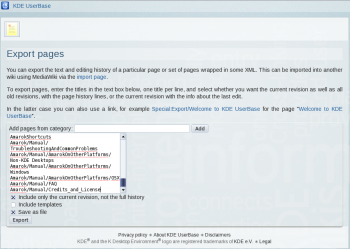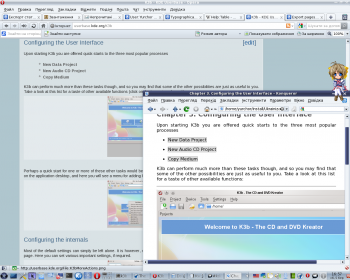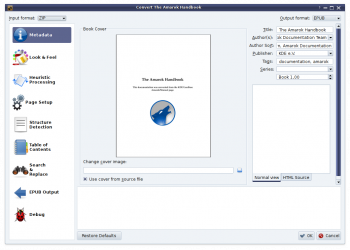How To Convert a UserBase Manual to Docbook/fr: Difference between revisions
Appearance
ChristianW (talk | contribs) Created page with "* Vérifiez que toutes les cellules des tableaux on un espace après la barre verticale de séparation '|' . Cette règle est conforme au [http://en.wikipedia.org/wiki/Help:Ta..." |
ChristianW (talk | contribs) Created page with "* Utilisez des noms d'application qui aient un format cohérent (évitez '''Amarok'''s, mais utilisez '''Amarok's''')." |
||
| Line 39: | Line 39: | ||
* Vérifiez que toutes les cellules des tableaux on un espace après la barre verticale de séparation '|' . Cette règle est conforme au [http://en.wikipedia.org/wiki/Help:Table formatage usuel de wiki]. | * Vérifiez que toutes les cellules des tableaux on un espace après la barre verticale de séparation '|' . Cette règle est conforme au [http://en.wikipedia.org/wiki/Help:Table formatage usuel de wiki]. | ||
* | * Utilisez des noms d'application qui aient un format cohérent (évitez '''Amarok'''s, mais utilisez '''Amarok's'''). | ||
* Vérifiez que ''toutes'' les images sont au format PNG. | * Vérifiez que ''toutes'' les images sont au format PNG. | ||
Revision as of 20:18, 2 June 2018
Préface
Le processus actuel n'est pas encore peaufiné, le code du script est sale, pas assez intelligent, etc ... La seule excuse est qu'il fonctionne quand même ![]() .
.
Si vous voulez améliorer le processus, que vous avez une bonne expérience de Python, et que vous connaissez les principes du maniement de docbook, vous pouvez améliorer la procédure. Veuillez contacter Yurchor si vous vous sentez en mesure d'apporter votre aide.
Préparer les pages pour la conversion
- Vérifiez que les pages de votre manuel respectent bien les directives des contributeurs de UserBase ainsi que les règles typographiques.
- Vérifiez dans la table des matières, que chaque page a son titre indenté conformément au niveau qu'elle doit avoir.
Tableau de référence UserBase Docbook Commentaire ==Section== <chapter> ===Section=== <sect1> ====Section==== <sect2> =====Section===== <sect3> ======Section====== <sect4> Ne pas utiliser ce dernier niveau dans la mesure du possible
- Vérifiez que toutes les cellules des tableaux on un espace après la barre verticale de séparation '|' . Cette règle est conforme au formatage usuel de wiki.
- Utilisez des noms d'application qui aient un format cohérent (évitez Amaroks, mais utilisez Amarok's).
- Vérifiez que toutes les images sont au format PNG.
- Enlevez tous les caractères non imprimables présents dans le nom des images.
Exporter
- Prepare the page list (strip from UserBase addresses http://userbase.kde.org). Example for Amarok:
Amarok/Manual/Introduction
Amarok/QuickStartGuide
Amarok/QuickStartGuide/GettingStarted
Amarok/QuickStartGuide/TheAmarokWindow
Amarok/QuickStartGuide/TheMusicCollection
Amarok/QuickStartGuide/Playlists
Amarok/QuickStartGuide/TheContextView
Amarok/QuickStartGuide/HowToDealWithProblems
Amarok/QuickStartGuide/Glossary
Amarok/Manual/AmarokWindow
Amarok/Manual/AmarokWindow/Toolbar
Amarok/Manual/AmarokWindow/MediaSources
Amarok/Manual/AmarokWindow/ContextPane
Amarok/Manual/AmarokWindow/PlaylistPane
Amarok/Manual/ConfiguringAmarok
Amarok/Manual/ConfiguringAmarok/ChangingLayout
Amarok/Manual/Organization
Amarok/Manual/Organization/Collection
Amarok/Manual/Organization/CollectionScanning
Amarok/Manual/Organization/Collection/SearchInCollection
Amarok/Manual/Organization/Collection/OrganizeCollection
Amarok/Manual/Organization/Collection/RemoteCollections
Amarok/Manual/Organization/Collection/RemoteCollections/Ampache
Amarok/Manual/Organization/Collection/RemoteCollections/DAAP
Amarok/Manual/Organization/Collection/RemoteCollections/Samba
Amarok/Manual/Organization/Collection/RemoteCollections/UPnP
Amarok/Manual/Organization/Collection/ExternalDatabase
Amarok/Manual/Organization/Collection/WorkingWithMediaDevices
Amarok/Manual/Organization/CoverManager
Amarok/Manual/Organization/TagEditor
Amarok/Manual/Organization/Transcoding
Amarok/Manual/Organization/ScriptManager
Amarok/Manual/Playlist
Amarok/Manual/Playlist/SavedPlaylists
Amarok/Manual/Playlist/PlaylistFiltering
Amarok/Manual/Playlist/QueueManager
Amarok/Manual/Playlist/DynamicPlaylists
Amarok/Manual/Playlist/AutomaticPlaylistGenerator
Amarok/Manual/Various
Amarok/Manual/Various/Moodbar
Amarok/Manual/Various/AmarokOnOtherPlatforms
Amarok/Manual/Various/AmarokOnOtherPlatforms/NonKDE Desktops
Amarok/Manual/Various/AmarokOnOtherPlatforms/Windows
Amarok/Manual/Various/AmarokOnOtherPlatforms/OSX
Amarok/Manual/Various/TroubleshootingAndCommonProblems
Amarok/Manual/Various/FAQ
Amarok/Manual/References
Amarok/Manual/References/MenuAndCommandReference
Amarok/Manual/References/MenuAndCommandReference/AmarokMenu
Amarok/Manual/References/MenuAndCommandReference/ViewMenu
Amarok/Manual/References/MenuAndCommandReference/Playlist
Amarok/Manual/References/MenuAndCommandReference/Tools
Amarok/Manual/References/MenuAndCommandReference/Settings
Amarok/Manual/References/MenuAndCommandReference/Help
Amarok/Manual/References/KeybindingReference
Amarok/Manual/References/KeybindingReference/GlobalShortcuts
Amarok/Manual/References/KeybindingReference/AmarokShortcuts
Amarok/Manual/References/Credits and License
- Allez à la page export.
- Paste the page list into the text field.
- Click on .

- Save the file. The saved file will be called Manual.xml in what follows.
Conversion
- Install Subversion package for your system.
- Checkout the latest version of conversion script:
svn checkout --depth=files svn://anonsvn.kde.org/home/kde/branches/work/doc/
- Copy Manual.xml to the script folder.
- Add a line containing to the file /etc/hosts . (You will need root privileges for this. You only need to do this once.)
144.76.227.197 userbase.kde.org
- Run if you want to download all screenshots (it takes some time to download all images from UserBase, grep and wget should be installed), or
python wiki2docbook.py Manual.xml
if you need not to download images.python wiki2docbook.py -s Manual.xml
Post-processing
- Rename Manual.xml.docbook to index.docbook.
- Check if conversion was done correctly:
checkXML index.docbook
- Fix the errors (better on UserBase pages).
- Convert docbook to HTML:
meinproc4 index.docbook
- Check HTML pages (all images should be visible, links should not lead to 404-pages).
- Replace big images by thumbnails using convert from ImageMagick
- Fix links in docbook, so they lead to docbook section, not UserBase pages.
- Fix application name according to KDE entity list.
- Copy index.docbook and images to your /doc folder and commit them to repository.

Updating Your DocBook from UserBase
To update your converted docbook please use the following procedure:
- Re-export XML from UserBase. See Export section.
- Use the script to update the content (headers with abstract and keywords and footer will be kept):
python wiki2docbook.py -r index.docbook Manual.xml
- Check the docbook, rename the file into index.docbook and commit it with screenshots into your repository.
Convertir le DocBook vers un autre format
Convertir en PDF
Usually, there is no need to convert DocBook manually. You can download the converted PDFs from KDE Documentation site.
Should you need additional customization please do as follows:
- Make sure that you have some LaTeX distribution installed (usually, TeXLive).
- Create the following script file (named buildpdf.sh) in your DocBook directory:
'"`UNIQ--syntaxhighlight-00000019-QINU`"'
- Download KDE styles:
git clone git://anongit.kde.org/websites/docs-kde-org.git
- Tweak dblatex-cvs-install/bin/dblatex in like this
'"`UNIQ--syntaxhighlight-00000020-QINU`"'
(Change /path/to/your/ as appropriate)
- Copy KDE styles (/dblatex-cvs-install/share/dblatex/latex/contrib/) to some TeX dir where it can be found by LaTeX installation (I have copied them to /usr/share/texmf-dist/tex/latex/kde).
- Update paths with
mktexlsrfrom root.
- Run
./buildpdf.sh index.docbook. This should create ready-to-use PDF file for you. You can stop on this step if you do not want to tweak it.
- Copy all files from /tmp/tpb-your_user-digits to the work directory.
- Customize and edit tex file in Kile as appropriate.
- Compile PDF file with Alt + 6.
Conversion en EPUB
- Make sure that Calibre is installed in your system.
- Convert your DocBook into HTML first. Use
meinproc4 index.docbookfor this.
- Start Calibre and choose .
- Select index.html in your DocBook folder. Wait until the book is loaded.
- Choose .
- Fill the metadata fields as appropriate.

- Press and wait until the work is done.
- Copiez le livre de ~/Calibre Library vers votre lecteur de livres électroniques.

